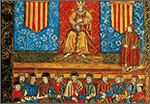|
|
|
 |
 |
 > The Forging of a King > Territorial Expansion… > ...and Government dijous, 31 de gener de 2008
This coming Saturday, 2 February, will be the 800th anniversary of the birth of the king of Catalonia-Aragon, James I, known as 'The Conqueror'. Count of Barcelona, King of Aragon, Valencia and Majorca, and Lord of Montpellier, James I is one of the most important historical figures in the Catalan Countries, a political, cultural and linguistic reality that took shape during his reign (1213-1276).
Various events throughout the Catalan Countries will commemorate the anniversary. Some of the highlights include a large exhibition that can be seen on the Balearic Islands, in Valencia and in Catalonia at the end of 2008. Besides the commemorative events, a number of books about the life and work of the monarch have appeared recently including 'The Conquest of Majorca' ('La conquesta de Mallorca'), by Agnès and Robert Vinas (Editorial Moll), 'The Conquering King. James I: Between History and Legend' ('El rei conqueridor. Jaume I: entre la història i la llegenda'), by Antoni Furió (Edicions Bromera), and 'James I. History and Myths of a King' ('Jaume I. Història i mite d'un rei'), by the Italian philologist Stefano Maria Cingolani (Edicions 62). Besides having historical rigor these books share a desire to impart knowledge on the part of their authors, who aim to distinguish myth from reality, legend from history. The son of King Peter the Catholic and Maria of Montpellier, James I's birth is a well-known legend in itself: as King Peter had rejected his wife, she is said to have conceived James after pretending to be one of his lovers.
The Forging of a King
+ The young king managed to impose his authority on the feudal nobility.
Born in Montpellier in 1208, James was orphaned at the age of five when his father died in the Battle of Muret (1213), putting paid to the possibility of creating a common homeland for Catalans and Occitans on both sides of the Pyrenees. From the age of six until nine James lived at the castle at Montsó, cared for and educated by the knights of the Order of the Temple. Gradually, the young king managed to impose his authority on the feudal nobility, who had taken advantage of his youth to rebel. He subsequently began his first great military undertaking: the conquest of Majorca.
Territorial Expansion…
+ James I conquered Majorca in 1229.
In 1229, the king's fleet arrived at the ports of Salou, Cambrils and Tarragona en route to Majorca, which James I conquered following three months of resistance from the Saracens. In December that year he conquered Palma. In 1231, Minorca became subject to the Catalan-Aragon crown and in 1235 he conquered the Pitiüses Islands (Ibiza and Formentera). The conquest of the future Kingdom of Valencia, begun in 1233, took longer, not being completed until 1245. James I entered the city of Valencia on 9 October 1238, an event commemorated as '9 October', Valencia's national day.
...and Government
+ Carving representing James I presiding the courts.
These victories gave shape to the Catalan Countries and helped promote a period of great expansion both demographically and in terms of trade. Furthermore, during the reign of James I there was a flowering of Catalan literature, exemplified by Majorcan writer Ramon Llull, considered the first great Catalan writer. The protection of the Jews, the strengthening of governmental institutions, such as the courts and municipal councils, and the beginning of the 'Book on the Consulate of the Sea' ('Llibre del consolat de mar'), a book of maritime code and customs, completes the work of the government set up by the king, brought together in one volume, the 'Book of Deeds' ('Llibre dels feits'), a chronicle dictated by the king himself.
|
Investiga

> Apunt biogràfic de Jaume I el Conqueridor.

> Entrevista de VilaWeb amb Antoni Furió, autor de 'El rei conqueridor. Jaume I: entre la història i la llegenda'.

> Jaume I: un enfocament nou, a càrrec de Stefano Maria Cingolani.
I també...
- Violant d'Hongria, el gran amor de Jaume I?
- Facsímil de la crònica de Jaume I.
- Jaume I, el personatge històric favorit dels espectadors de TV3.
Portada |
Europa Press |
El Punt |
La premsa |
Especials |
Diari de l'escola |
LesFinances.info |
Editorials |
Mail obert |
Els blocs |
Lletres
Tecnologia i ciència | Solidaritat | Cap de 7mana | Campus | El 9 | Presència | Fòrums | Enquestes | Xat | Correu
Traductor | Edicions en Pdf | Wap-pda | Biblioteca | Lletra més grossa
Tecnologia i ciència | Solidaritat | Cap de 7mana | Campus | El 9 | Presència | Fòrums | Enquestes | Xat | Correu
Traductor | Edicions en Pdf | Wap-pda | Biblioteca | Lletra més grossa
| Què és VilaWeb? Publicitat Mapa web Contacte | Una web de Partal, Maresma i Associats, S.L. |


